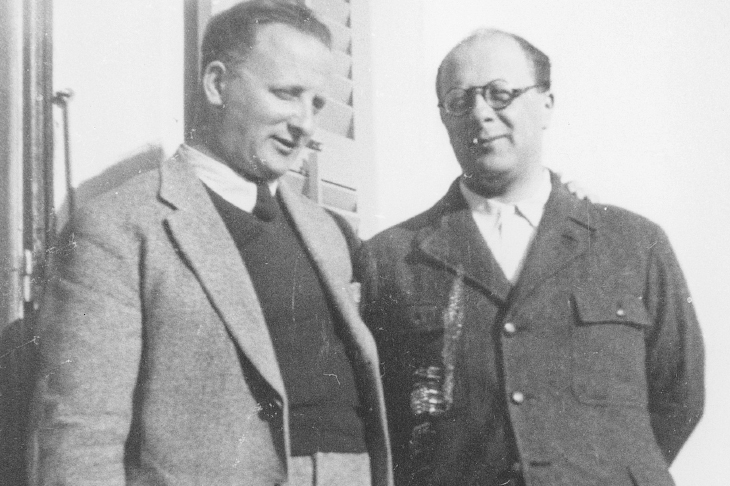The details of Mussolini’s fascism are perhaps not quite as familiar in this country as they might be. Even quite well-meaning people have a tendency to treat him as, in part, a joke. Just how horrible the period was needs to be explained with reference to individual lives. Caroline Moorehead’s book about the Rosselli family, who were central to the principled resistance, has a valuable and sobering subject.
They were intellectual and idealistic Jews. The matriarch, Amelia, from an eminent Venetian family, had married a clever and dissolute man. They had three sons together before Amelia had enough of his philandering, and left him with the children. She settled in Florence, and made a place for herself in radical Italian society.
The family had memories of the heroes of the Risorgimento, and now they aligned themselves with advanced opinion, including Filippo Turati, the leader of the Italian socialists. Amelia was supported by her husband’s investment income — eventually, their shares in a mercury mine would make them guiltily rich — but she also wrote. Her plays were staged, some with success, and her children’s books were published and read.
The intellectual milieu is fascinating. Italy was immensely fragmented, effectively speaking any number of mutually incomprehensible languages, and mostly very backward. Half the Italian soldiers who fought in the first world war were illiterate. At the top of society was an intricate meshing of aristocracies springing from different historical patrons, and then a furiously advanced intelligentsia. The revolutionary ideas emerging from the prewar salons included Futurism, whose leaders proposed the abolition of pasta and the filling up of the canals of Venice, but also radical communist and socialist proposals. There was, as so often, a real love of the prospect of violence — for aesthetic purposes in the case of the Futurists, but for others, it seemed a necessary political step forward.
The Great War might have sated a nation with all the violence it could ever desire; Amelia Rosselli’s eldest son, Aldo, was killed in action. Instead, it trained a generation for more brutality. The rise of Mussolini after the war was treated by his followers as a necessity. Mussolini himself spoke of ‘the great, the beautiful, the inexorable violence’. There were 300,000 Blackshirts by 1922, and 2,500 people had been killed in street fighting. In October he was invited to form a government. The threat from socialists and revolutionaries had been found quite useful in easing the fascists into power. In fact they were in a state of total disarray, and the socialists had fallen into such factional disagreement that Turati himself had been expelled.
How the liberal idealists would engage with, withdraw from, or fight against this terror is the subject of Moorehead’s book. In particular, this is the story of the Rosselli sons, Carlo and Nello. Carlo, along with Feruccio Parri and Sandro Pertini, afterwards prime minister and president of Italy, organised Turati’s escape to France. They founded a radical antifascist movement, Justice and Liberty. Both brothers were imprisoned, and when released, were closely followed by the authorities. In the end, in 1937, they were murdered in France by thugs at the behest of the authorities, with a French extreme-right group acting as the go-between.
One of the great classics of 20th century Italian literature tells the story from another angle. Natalia Ginzburg was born into an intellectual and liberal Jewish family from exactly this circle, and in Lessico Famigliare (Family Sayings) she beautifully conveys both the intoxicating atmosphere of her family, the Levis, and the terrible vulnerability of her circle to the horrors that followed. Her husband, Leone Ginzburg, was tortured to death in prison. He is mentioned in passing by Moorehead, but it’s curious that she doesn’t refer at all to the most famous Italian book about this circle. According to Lessico Famigliare, Ginzburg’s mother and father knew the Rossellis for ‘many years’ and her brother, Mario Levi, was given money by Carlo Rosselli in Paris, before he broke all ties with the Justice and Liberty movement. Moorehead has a crowded story to tell, and Mario Levi is mentioned in passing, but it does seem extremely odd not to make any use of, or reference to, this wonderful witness.
More trivially, I wish somebody at Chatto had gone over the text more thoroughly, as it is blemished by a number of irritating small slips — confusing the Emperor Franz Joseph for the Emperor Joseph, calling the Café Demel the Demerol, misspelling ginnasio (the Italian school) as gimnasio and the Via Giambologna, where the family lived, as Gianbologna. All quite understandable, but not necessary.
It’s a shocking and very powerful story, and can hardly avoid putting the question — what would you do in these circumstances? The Rossellis were heroic, and like most heroes, behaved as if they had no choice in the matter. In reality, most of Italy did choose — in the other direction. Whether we are ever asked again to do anything but go on chattering when stuff gets real, it is worth reading about the Rossellis and, certainly, Natalia Ginzburg’s shattering memoir in tandem to see what some intellectuals, at least, are capable of.






Comments